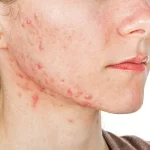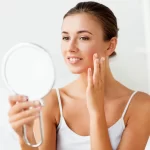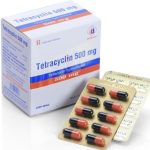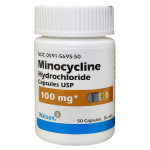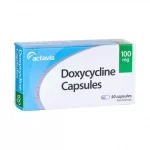Are you in search of an adequate adult acne treatment? Five out of ten females deal with adult acne. A little over 50% of adult females and roughly 43% of adult males develop mild to severe acne in their 20s. While the number of adults affected by acne declines when adults reach their 30s, there are still more than 35% of females and over 20% of adult males who develop the condition. When adults reach their 40s, people affected by the condition declines further, with 27% of females and 12% of males developing acne, and over 15% of females and 7% of adult males in their 50s have to deal with acne related conditions. While it seems that age plays an important role in the onset of acne, it is not uncommon for adults of any age to have to seek out powerful adult acne treatment options at some point during their adult lives.
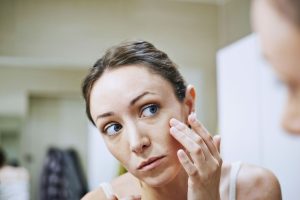
The Causes of Adult Acne
The origins of adult acne are difficult to define because there are so many different causes sited as potential triggers for acne during adulthood. In fact, a person may suffer from the condition when it is brought on by a single cause or a combination of different causes can prove to be at the root of the problem. Some of the most popular causes identified as acne triggers include things like stress, sleep imbalances, lifestyle triggers, hormonal triggers, genetics, environmental triggers, and dietary imbalances.
- Stress
A common cause cited for the onset of acne in adults is stress. Anything that occurs that causes a taxation of one’s physical or emotional well being can trigger stress. Adults can experience emotional stress brought on from health related conditions, relationship issues, excessive work or tense work conditions, anxiety, or from other events. Physical stressors are triggers that include things like drug use, smoking, obesity, a sedentary lifestyle, a chaotic, busy, or overly hectic lifestyle, a lack of sleep, or a strain of the body from too much exercise or activity. Stress has a baneful influence on the body’s natural immune system that can result in inflammatory effects or conditions like adult acne onset. - Sleep Imbalances
When you do not get adequate amounts of sleep, you can quickly become sleep deprived. Through sleep deprivation, you can cause the natural increase in inflammatory conditions in your body; you can cause an increase in your body’s resistance to insulin, and you increase the emotional as well as physical stress on your body, all of which can later lead to acne eruptions. Not getting enough sleep can even weaken your immune system responses, which can lead to the overgrowth of acne causing bacteria. - Hormonal Triggers
Pregnant females, premenstrual females, women undergoing menopause, and women who develop hormonal imbalances also have a tendency to develop adult acne. This, of course, does not mean that hormonal imbalances do not also cause acne in adult males, but it does mean that some of the life events women go through make them more prone to developing the condition. Even something as simple as the cessation of using oral contraceptives can be the root cause for an acne eruption: female health conditions like polycystic ovary syndrome sometimes trigger acne outbreaks. If you suspect hormones behind your acne outbreak, it is time to talk to your doctor about identifying the imbalance so you can choose the appropriate adult acne treatment. - Genetics
When it comes to adult acne, even genetics can play a role in the development of eruptions during adulthood. If your mother or your father had acne related issues, the likelihood that you will develop adult acne is higher. Research has revealed that there is a greater prevalence of acne related conditions in adults who have family members who also have acne related conditions. Interestingly, studies also reveal that identical twins are more likely to have similar acne issues than fraternal twins. - Environmental Triggers
Environmental acne triggers for adults can come from the natural environment or they can be psychological in nature. For instance, a person that has issues with depression or a similar psychological disorder that produces stress in the body can be a potential cause for acne. Nevertheless, acne can be caused by exposure to allergens, chemicals, air pollutants, or toxins too. Everything from exposure to grease, oils, exhausts, dirt, or soot can contribute to adult acne and its onset. - Dietary Imbalances
Imbalances in your diet can produce acne eruptions as well. For instance, if you consume too much dairy, the body may begin producing too much oil or sebum as a direct result to some of the hormones used in dairy products. Some research also suggests that a diet with a high glycemic index or a diet where one consumes excessive amounts of refined sugars, flour, or white rice can cause the rapid increase of glucose in the blood that can lead to insulin resistance and acne conditions. Meanwhile, excessive intake of products containing iodine has also been cited for causing acne eruptions.
Adult Acne versus Teen Acne
The differences between adult acne and teen acne are few. First, probably 95% of all teens experience acne conditions, while the percentage of adults that experience acne eruptions declines with age: this suggests that teen acne is most likely due to the onset of puberty and the bodily changes that result. In addition, when it comes to teenagers, acne prevalence seems equal across the board, effecting males and females equally, but in adult acne related conditions, it appears that the condition affects more females than males. Nevertheless, despite these small differences, the causes of teen and adult acne are similar, as are the available treatments for the condition. One may find however, that adult acne treatments are sometimes a bit more powerful than those prescribed for teens, especially if considering oral antibiotics or prescribed acne medications; basically, medical treatments are age appropriate and based upon size, weight, and the age of the patient in question.
Adult Acne Treatment Options
Finding the right adult acne treatment involves identifying the potential causes of the condition and choosing the suitable adult acne treatment to deal with the identified cause. There are a number of adult acne treatment solutions available. Adults and teens can use products containing glycolic acid, salicylic acid, or Benzoyl peroxide to treat mild to moderate acne. Meanwhile, for more severe conditions, a doctor can prescribe an antibiotic remedy.
Adults will want to reduce stress levels when they are looking to make the most of any adult acne treatment. An increase in sleep is necessary for adults that are sleep deprived, and there are natural as well as prescribed remedies for any hormonal imbalance suspected as the cause for a case of adult acne. While genetic contributions cannot be changed, a person with adult acne can definitely assess his or her environment for potential acne triggers. If a trigger is identified, it will be necessary either to remove the trigger from the environment or to avoid the acne trigger whenever possible.
Finally, the consumption of a healthy acne diet and the avoidance of foods or beverages thought to contribute to adult acne onset are also recommended.

